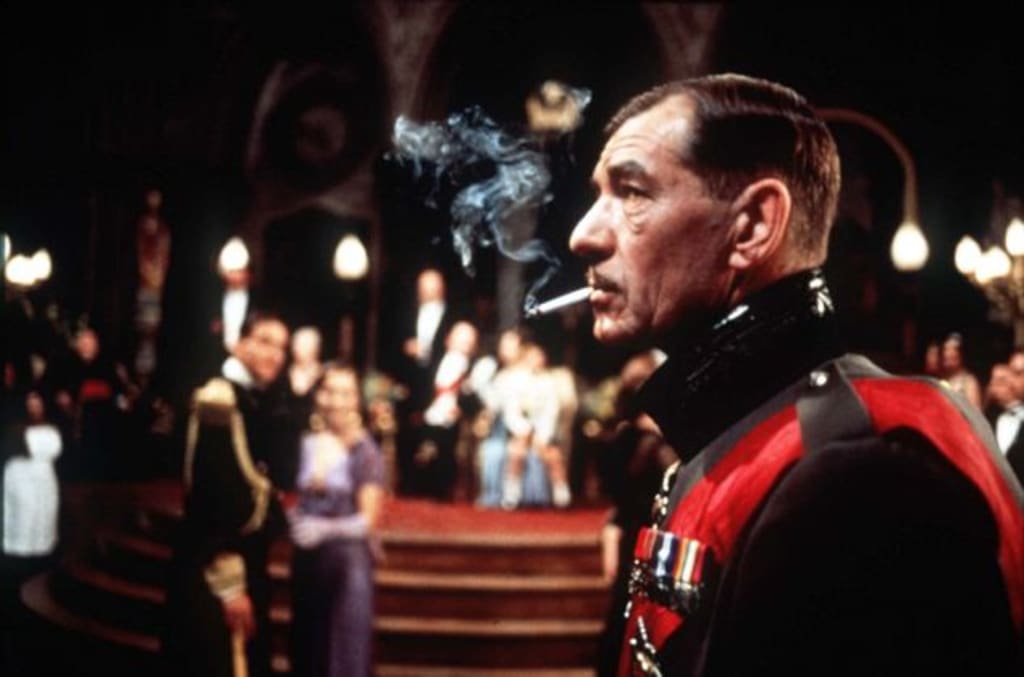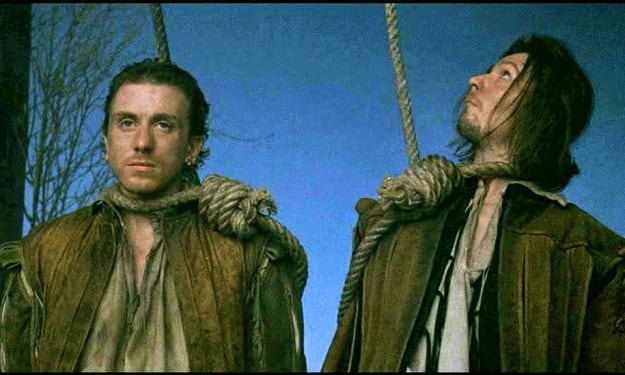The Struggle to Adapt
How Richard Loncraine's 'Richard III' Makes a Shakespearean Classic His Own

The greatest pain in adapting a stage play to the screen is bridging the disconnect between the experience of a film viewer and a playgoer. Whereas the play is for the most part stationary in its setting, the film is fluid. Whereas the performance of a play is ever-changing with each performance, the film remains fixed in existence. These differences are felt most prominently in the adaptation of a Shakespearean work, as these plays were written at a time when the very concept of filmed performance was beyond the bounds of the imagination. They were written with the knowledge that the play could not be fully realized without the audience’s active suspension of disbelief. Film has neither that luxury nor burden, as modern filmmaking affords the audience with an abundance of details, ensuring their disbelief is not suspended to a point of distraction from the drama at hand. As such the Shakespearean film adaptation loses some of its originator’s charm, and in turn demands creative liberties to fill the gaps made in the act of adapting. A straightforward stage-to-screen adaptation is impossible (the word “impossible” here meaning “incapable of being good”), for the qualities of a play are far too dissonant from the qualities of a film, and therefore adaptation necessitates reimagination. This necessity can be best explored in Richard Loncraine’s 1995 film Richard III. Loncraine’s film adaptation takes incredible liberties with the source material, most namely in setting and music, while still adhering to the original text. In doing so, Loncraine more adeptly captures the original tone of Shakespeare’s play than could a film adaptation that strictly follows how the piece would have been performed at the time of its writing.
The most noticeable difference between the stage production and film production of Richard III is the setting. While Shakespeare wrote the play as a historical tragedy, and therefore set the piece in his own time period in Britain, Loncraine changes the setting almost entirely. Loncraine’s version of the story still takes place in Britain, but in a fictionalized fascist Britain that draws inspiration from Nazi Germany. Loncraine adapted the play to such a setting to better replicate for a modern audience how a Shakespearean audience would understand the political atmosphere of the play. Richard III was written about real historical figures who played major parts in the Wars of the Roses, the deadly power struggle between two Houses laying claim to the throne of England. The War of the Roses is characterized by the intertwining relationships between people in power and by the treachery that can be committed by those infatuated with power. Richard III was originally written under the assumption that the audience was aware of this power struggle, and as such there was a certain relatability to the audience that is not immediately accessible to a modern audience. Loncraine chose to set the film in a climate analogous to World War II because it is the best modern parallel to the political atmosphere of the War of the Roses.
In addition to being characteristically similar to the original Shakespearean setting, the World War II framework aligns Richard with the Nazis, directly aligning Richard with the purest evil known to modern society. Richard Gloucester (Ian McKellen) and other members of royalty wear military attire bearing significant resemblance to the Hugo Boss-designed SS uniforms of World War II. Richard’s military address is adorned with red banners strikingly similar to the swastika-adorned flags that have come to represent the height of human villainy and evil. This milieu of maliciousness serves as a means to emphasize the themes of the original text while simultaneously creating an attitude towards Richard’s character for a modern audience in a way that matches the Shakespearean audience’s predisposition against him. Popular culture and the rumor mill in the Shakespearean era had already painted King Richard III in a negative and villainous light, so by the time Richard III premiered on stage the public was well aware of how to perceive the titular character. This common knowledge is not so common in the current day, and so a similar historical precedent such as Adolf Hitler and the Third Reich is needed to serve as a basis for comparison. By equating Richard with a more accessible counterpart through the formal elements of costume and setting, Loncraine allows the audience to experience the story with an established understanding of character just as the original audiences of Richard III did in Shakespeare’s time.
Additionally, the likening of Richard to Adolf Hitler further underscores the themes of Shakespeare’s text. The most important aspect of Loncraine’s adaptation is not the fact that the film is markedly different from the original staging, but the fact that it is such while still using the original words written by Shakespeare. In Act I Scene I, Richard states, “And therefore, since I cannot prove a lover, / To entertain these fair well-spoken days, / I am determined to prove a villain / And hate the idle pleasures of these days.” Shakespeare outright condemns Richard and declares him a villain within the first 30 lines of the play, vilifying his lust for power and its bloodstained pursuit. In comparing Richard to Hitler, Loncraine not only makes Richard’s evil more accessible, but further bolsters Shakespeare’s condemnation of such evil. Modern audiences are more inclined to hate Richard as original audiences did if his visage conjures imagery of those most reviled in recent memory, and it is this hatred that emboldens Shakespeare’s original criticism of those who are blinded by power.
The greatest difference between film and stage is the advent of the film score. While some plays feature live performers to score the drama, the majority of plays are performed without music affecting the audience’s understanding of the work. Plays are almost entirely driven by dialogue and action, while films include non-diegetic music to further the tone of the story and to give emotional cues to the audience. While Shakespearean works did feature songs, they were often performed by players (usually those who played fools) rather than existing outside the reality of the story and underscoring the actual drama. This is an important addition to any Shakespearean adaptation because there is no theatrical precedent, and therefore provides meaningful insight to the director’s intentions with the film. In Loncraine’s Richard III, music is used not only to establish the 1930s time period as described earlier, but also to drive emotion and support the themes of the original text. This can be seen in the ballroom scene after the title and the final scene of the film before the credits.
The ballroom scene is incredibly interesting in its use of music in that it plays three vital roles. Firstly, the music for this scene begins as non-diegetic music, providing backdrop to each character’s silent introduction. Since the film adheres to the original text of the play, and since the film begins far before Richard’s first monologue, the music plays a vital role in establishing the central players of the story. The jazzy instrumental of the song that surrounds these characters’ introductions lends a light and joyous atmosphere, musically paralleling Richard’s first line that “Now is the summer of our discontent.” It serves as an emotional high for the characters so as to contrast with the bleakness ahead for the royal family, the song’s cheerful melody a subtle reminder that tragedy begins in jubilation. Secondly, it is soon revealed that the song is actually existent within the diegesis of the film, as it is being performed at a large celebratory ball. This revelation shifts the tone of the song from that of mirth to that of royalty, in establishing that every person of import in this story is of high status, an important characteristic that is not explicitly stated in the dialogue.
Lastly, this song is actually a subtle ode to the film’s humble Shakespearean origins. If viewers listen closely, they might notice that the lyrics to the song being performed are actually adapted from a sonnet written by Shakespeare’s collaborator Christopher Marlowe. In adapting this sonnet to serve as an introductory song to the film, Richard Loncraine is making a meta-commentary on the performative nature of humanity and how this performance ties into the difficulties of adaptation. Shakespeare famously wrote in As You Like It that “All the world’s a stage, and all the men and women merely players.” This sentiment is a recurring theme in Shakespeare’s plays, and is evident in Richard III in that Richard is always performing his own reality to those surrounding him, only revealing his true self to the captive audience in the theatre. Shakespeare’s affinity for the performative nature of mankind is interesting in that Shakespeare has often drawn criticism for not giving Christopher Marlowe his due credit as a collaborator on his plays.
It is here that Shakespeare himself has his own performance to the world, a performance that Loncraine then adapts by having a singer perform Marlowe’s words as if they were Shakespeare’s in his film that strictly adheres to Shakespeare’s original text. In addition, Loncraine has adapted the lyrics to fit a 1930s jazz instrumental, serving as a miniature model for his entire reimagining of the play. This is especially clever in that many Shakespearean scholars believe the first few lines of his plays reveal the entirety of the plot and themes within, just as Loncraine has revealed the entirety of his own film in adapting Marlowe’s sonnet to a song within his adaptation of Shakespeare’s play. This meta-commentary serves as an incredibly intricate and subtle parallel for Richard III, in that Loncraine is setting up the concept that even within Shakespeare’s plays, the diegetic world can still serve as a stage for its own cast of players.
Another interesting song choice in Loncraine’s Richard III is the final song that plays as Richard falls to his ultimate demise. Whereas most Shakespearean tragedies end in a death characterized by regret and woe, Ian McKellen and Richard Loncraine chose to have Richard die with a smile on his face as he descends into a hellish pit of fire. As he does so, an upbeat and jazzy tune as the singer croons, “I’m sitting on top of the world!” This is an important moment of characterization in that it truly defines Richard’s depravity more than any other moment in the film. Loncraine and McKellen refuse to allow the audience any semblance of sympathy or sorrow for Richard’s death; instead they allow Richard to revel in his own demise as he has made peace with the atrocities committed and his fate beyond the grave. Richard never truly wavers from his choices and has no regret for his actions, as proved by the victorious death he is granted in the film. Additionally, Richard’s death is beyond indulgent, serving as a parallel for Richard’s self-obsessed desire for power. By dropping into the fire instead of allowing Richmond to shoot him, Richard takes one final chance to assert power over others, refusing to die at the hands of his enemy but rather giving himself the power to die at his own will. Richard’s hunger for power is as decadent as the death he dies, and this is most strongly emphasized by the grandest of songs playing him out.
Richard Loncraine’s Richard III masterfully crafts a Shakespearean adaptation that is both true to the intent of the original work while still being inventive, thoughtful, and modernly accessible. Through the formal elements of setting and music, Loncraine establishes a world in which Richard is as depraved as he was in his heyday without alienating those who do not have the full historical context. Loncraine’s choices in music give the audience a deeper insight into his intentions behind adapting Richard III while playing a significant role in characterization that cannot be done on stage. The filmic elements of Loncraine’s Richard III serve not only as a way to make adapting the play easier, but more importantly as a means to further explore the characters and themes of Shakespeare’s original play in such a way that is only possible through adaptation.
About the Creator
Devin O'Brien
I'm an essayist, humorist, and film critic. Hope you enjoy my work!






Comments
There are no comments for this story
Be the first to respond and start the conversation.